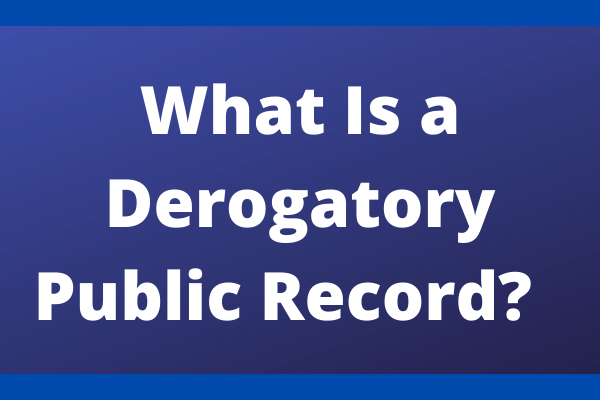What Is a Derogatory Public Record?
If your recent credit application was rejected, you will receive a letter from the prospective lender that details the reason why. The most common reason for this rejection is because your credit report contains a derogatory public record.
A derogatory record refers to negative details on your credit report that can lower your credit score. This record could be a minor concern such as several late payments or something more serious like bankruptcy. The easiest way for you to know what really shows on your credit report is to personally get a copy of it to check it out.
Derogatory Record – A Quick Overview
The meaning of a derogatory record can vary according to the specific type of record found. In case you make several late payments to the credit card issuer and this information is reported to the credit bureaus, your credit report will get a derogatory entry.
However, a derogatory record often means something that is more serious. Public records are pieces of information that almost anyone can access about you with a simple trip to a local courthouse. This is the reason why derogatory public records are often made up of civil court judgments, bankruptcy filings, tax liens, and foreclosures. There are some states where delinquencies on child support are considered as public records as well.
Derogatory Records – Where Do They Come From?
Most creditors are going to report your current account balance, payment history, and credit limit directly to the three credit reporting bureaus. The result is that even a single late payment may appear on your credit report.
However, credit reporting bureaus don’t rely on your creditors alone. Similar to how anyone can go through the public legal records, credit bureaus can also do the same and that is exactly what they do. Details regarding property liens and court judgments are all included in your credit profile.
For instance, you borrow money from a friend but you were not able to pay him back as agreed upon for one reason or another. Your friend is enraged, files a case against you in a small claims court and he wins the case against you. While it is possible that your friend doesn’t get in touch with the credit bureaus to report your debt, your credit file will still contain the liability since the court proceeding is a public record already.
Impact of Derogatory Records
The effects of a derogatory record on you and your credit score are dependent on the specific record itself. In the event that you had a late payment to your creditor yet you were able to get right back on track, the derogatory record regarding the late payment might show up on your credit yet its impact might only be minimal.
On the other hand, serious delinquency can come with some serious consequences. Once you file bankruptcy or go into foreclosure, expect that potential creditors will notice it. Potential employers may also go through your credit as a part of their hiring process. It is a common practice in the industries of accounting and finance where your job can give you access to the money of another person.


